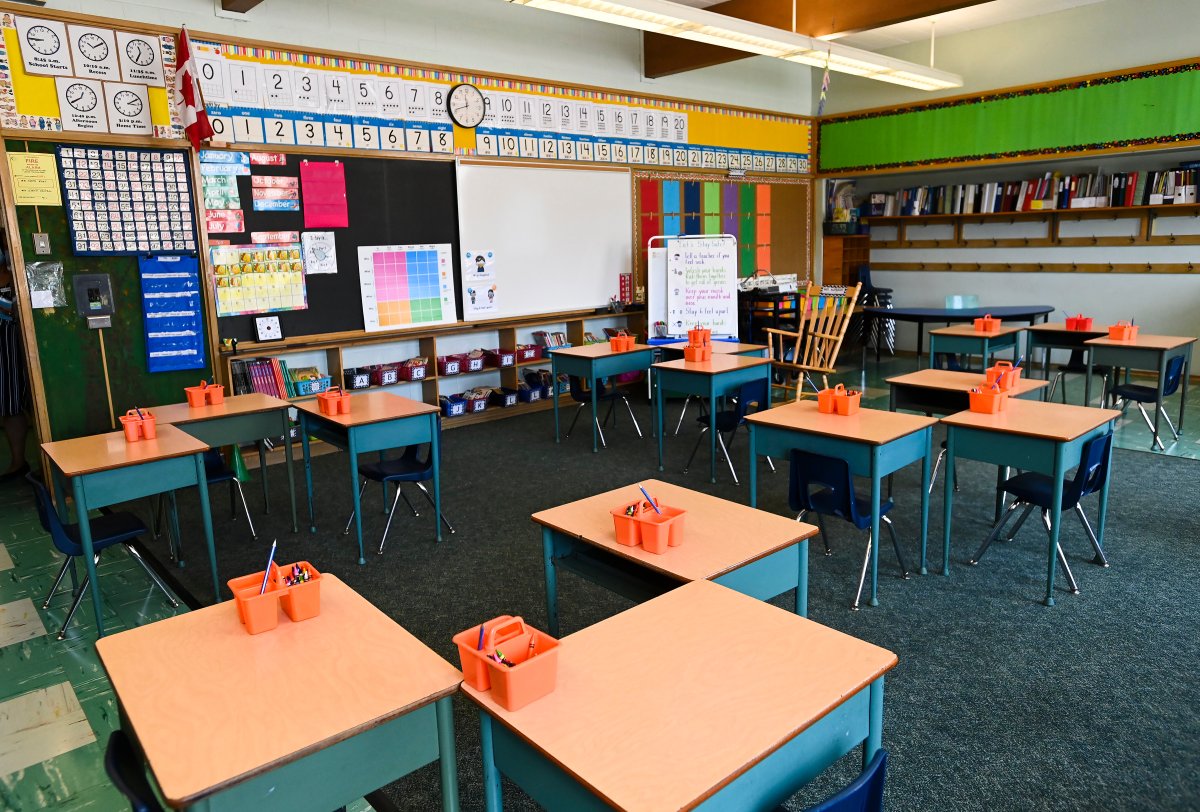Indigenous education experts in London, Ont., are applauding an announcement related to curriculum updates as a welcome, if overdue, change.

On Wednesday, Ontario announced that the curriculum for grades 1 through 3 will be revised by September 2023 to include First Nations, Métis and Inuit education as well as the history of the residential school system.
“The timing of this announcement is late, but what it stands to do is much more important,” Christy Bressette, vice-provost and associate vice-president of Indigenous Initiatives at Western University, told Global News.
“The fact that now Ontario is going to be mandating curriculum updates and changes in the curriculum is great news, because with that, hopefully there will become funding and we can have this move forward in education.”
Ray John, a teacher and Indigenous cultural adviser with the London Catholic District School Board, calls it “a start.”
“Working for the London District Catholic School Board, we started doing snippets of that already. When I used to go in in person, I would teach the kids dancing from my people and talk about the history and talk about things like that.”
John also offers an additional qualification course for teachers through the Ontario English Catholic Teachers’ Association. The mini-course focuses on Haudenosaunee life, “past, present and future.”
- What is a halal mortgage? How interest-free home financing works in Canada
- Capital gains changes are ‘really fair,’ Freeland says, as doctors cry foul
- Budget 2024 failed to spark ‘political reboot’ for Liberals, polling suggests
- Peel police chief met Sri Lankan officer a court says ‘participated’ in torture
John says it’s crucial that education start early through age-appropriate content.
“Having knowledge keepers, elders, grandparents come in to share the stories and just share with them what it was like during that time so that they begin to paint a picture that not all Indigenous people are the same and that the history that is here needs to be talked about,” he explained.
“And I know that in other facets of history, they talk about the Holocaust, they talk about slavery, and anything in there is ‘proceed with caution.’ The same thing here. Once they get the understanding then we can increase that knowledge a little bit more with awareness in the upper grades.”

Focusing learning on what’s local to the students is also an approach John recommends. For example, within the London area are the Chippewas of the Thames, Munsee-Delaware Nation and Oneida Nation of the Thames.
“Three local, three different, and lifestyles are so completely diverse, their language is diverse. Just pick one and learn about it and that way that gives you a starting sense and then you can move on to the next two.”
Sara Mai Chitty, curriculum and pedagogy advisor with Western’s Indigenous Initiatives, also pointed to the importance of learning about local connections versus “this big overarching sort of curriculum.”
“It’s not going to include that (residential school) Mount Elgin was a couple of kilometres outside of London where many people from Chippewas of the Thames First Nation and Oneida Nation of the Thames went. People don’t know that.”
Expanding and improving education can happen at all levels, Bressette noted. A formal Indigenous curriculum is currently in development for faculty at Western University, which will, in turn, help better inform students.
“When students leave Western, they will have had opportunity to understand their chosen discipline from an Indigenous perspective. That is really, really important and that’s what’s needed to help transform how society functions and thinks.”
In particular, Chitty said understanding is key for those studying in the fields of medicine, law and education.
Western University is also in the process of developing an Indigenous Learning Space, expected to open in the spring of 2022. The space will be in the building that used to house the faculty of education’s library.
Outside of the formal education system, experts stress to everyone that “it’s never too late to learn.”
Chitty suggests starting with “‘What do I know? How do I know that?’ And start interrogating why you just accept that narrative as the narrative.”
“Maybe the sustainable and equitable futures we all want for all of our children are possible through seeing the world in a bit of a different lens.”
Thanks to technology, Bressette says “stories can be found everywhere now in the media.”
With the changing curriculum, John added that parents and guardians may find themselves learning from their children.
“Don’t be afraid that you didn’t learn it, but take the opportunity to learn now. And I think we can use that phrase ‘You’re never too old to learn something.’ I was often asked that question and comment: ‘I didn’t know this. How do we start?’ It starts with a conversation,” he said.
“If you don’t know it, of course there’s going to be a point where you’re going to offend, but that is how we learn. We learn from the mistakes and we move forward.”
The Indian Residential Schools Crisis Line (1-866-925-4419) is available 24 hours a day for anyone experiencing pain or distress as a result of their residential school experience.








Comments